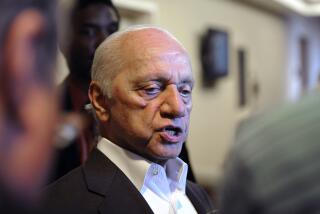Autry--Man With the Midas Touch
- Share via
In 1991, Forbes magazine remarked that while some entertainers were raking it in at record rates, only one was among the Forbes Four Hundred, the magazine’s list of the super rich.
He was Orvon Gene Autry, the Singin’ Cowboy, worth an estimated $300 million. He got there, the magazine said, by investing, not by strumming his guitar. “As smart an investor as they come,” the magazine concluded.
Behind the fistfights with movie villains, the traveling rodeo shows and the hit recordings has been a shrewd businessman who, according to those around him, had an uncanny ability to recognize opportunity and seize it.
He was the first major movie star to recognize the potential of television and exploit it by producing and appearing in his own shows. He was the first rodeo producer to inject theatrical gimmicks like wagon trains and dancers into rodeos, selling out his shows in both this country and Europe.
He bought luxury hotels, movie-set ranches, flagging television and radio stations and pumped them back to life. When he needed sports programming, he bought a baseball franchise, the Los Angeles (later California) Angels.
Now 87, he has sold most of them, and Thursday came the announcement of perhaps the most spectacular sale. The Walt Disney Co. said it had agreed to buy the Angels from Autry, 25% now (for a reported $30 million) and the rest upon Autry’s death. Disney will take over management of the team as soon as the deal is signed.
*
Like the other sales in recent years, the Angels are being dealt away because at Gene’s age he “would like to retire, and I’m 54 and would like to retire,” said Jackie Autry, who as Gene Autry’s wife has been, in effect, running the team in recent years.
Also mixed into the decision are large losses--$11 million last season, and a projected $12.5 million in the coming season, according to Angels sources.
Stan Schneider, Gene Autry’s longtime personal accountant, says Autry probably made money with the Angels in the long run; he bought the franchise for $2.45 million and reportedly is selling it for about $120 million. But unlike the Autry of broadcasting and hotel management, Autry ran his team as many other owners did--with a desire to win a World Series, sometimes at the expense of profits.
Once Jackie Autry took control, she said in numerous interviews that such an approach must stop.
“There were times when [radio station] KMPC’s profits were carrying the Angels,” Schneider said.
“I think he endured things in baseball he wouldn’t have endured anywhere else because of his love for the game,” said Allan H. (Bud) Selig, owner of the Milwaukee Brewers and acting baseball commissioner. “He’s a very good businessman, but he really had an incredible love for baseball. It’s tough finding ownership like that anymore.”
Only the O’Malley family in Los Angeles and Anheuser-Busch in St. Louis have owned their franchises longer.
For Autry, “everything came from the entertainment dollars,” said Schneider of Los Angeles. “Young people don’t know and a lot of people have forgotten that in the 1930s he was one of the biggest earners in the world.”
*
Born in Tioga, Tex., and raised in Oklahoma, he was working as a railroad station telegrapher when a passenger, entertainer Will Rogers, overheard him singing and strumming a guitar. Rogers urged him to pursue a singing career.
He first appeared on radio in 1928 and made his first recording a year later. In 1931, he wrote and recorded “That Silver-Haired Daddy of Mine,” which sold a phenomenal number of records for the time--about 30,000 in the first month.
When sales reached half a million two years later, Autry’s press agent and a record company executive devised an award for him that is now an industry standard: the gold record. The platinum record had to be invented for his all-time biggest hit, “Rudolph the Red-Nosed Reindeer.”
In 1934, he began making B-movie Westerns and serials. In 1935, he made what is considered to be the first singing-cowboy movie, “Tumblin’ Tumbleweed,” and from then on played only one character: Gene Autry.
Though he never emerged from the B-movie category, his popularity grew to the point that in 1940 only three actors--Mickey Rooney, Spencer Tracy and Clark Gable--outranked him as a box-office draw. The next year he made $600,000, the equivalent of about $6 million today.
The money went to investments, says Schneider. “Gene had a knack of being in the right place at the right time,” he said. “He just had an instinct for what would work.”
In the 1950s, it was radio stations. He bought a nearly bankrupt KMPC in Los Angeles and turned it into one of the most profitable in the nation. He bought more in Phoenix, Seattle and San Francisco, calling the chain Golden West Broadcasters.
He bought TV stations KOOL in Phoenix and KTLA in Los Angeles, producing some of his own programming and playing his old movies. KMPC broadcasted Los Angeles Dodgers games, but when the Dodgers moved to another station, Autry bought his own baseball franchise.
Along the way he bought hotels--The Mark Hopkins in San Francisco, the Continental in Los Angeles, the Ocotillo Lodge and the Autry in Palm Springs.
“Just look at the Angels and you know that he knows how to market things,” said Rose Narba, who managed the Autry hotel in Palm Springs until the Autrys sold it. “He’s lived by a cowboy code that’s unique. He’s a legend, but he still believes in shaking hands. To him, that makes a deal.”
“A lot of movie stars think they’re big-assed birds, but Gene always used to talk to the cowboys,” said Frank Bogart, former Palm Springs mayor and one of Autry’s rodeo cowboys. “He was always just a good old boy. Whenever he comes down here, he calls up and we have lunch. And all he wants to talk about are the old cowboys.”
Virtually all of Autry’s businesses have been sold now to minimize inheritance taxes and to lessen the business load, Schneider said.
“It was a nice empire, wasn’t it?” he said.
Times staff writers Greg Johnson and Mike DiGiovanna contributed to this report.
More to Read
Go beyond the scoreboard
Get the latest on L.A.'s teams in the daily Sports Report newsletter.
You may occasionally receive promotional content from the Los Angeles Times.






